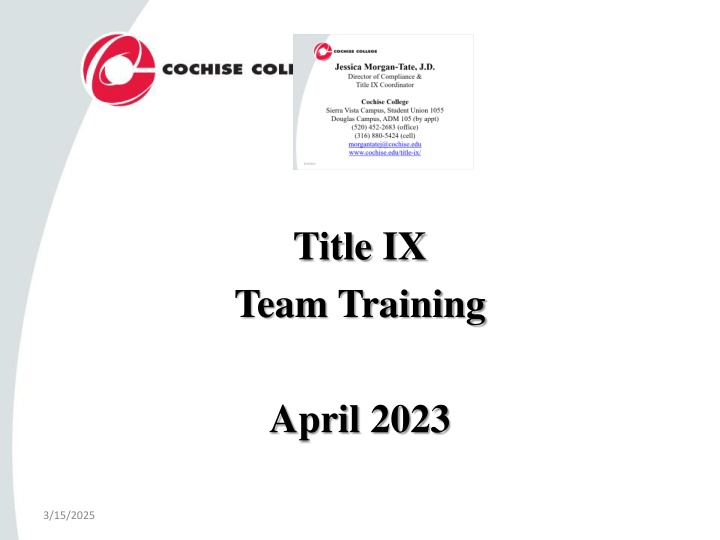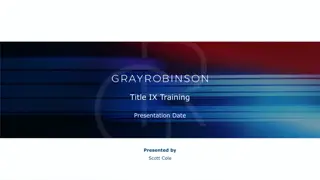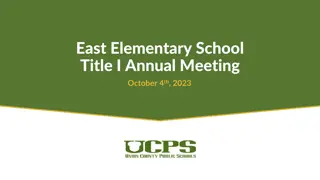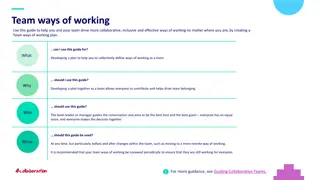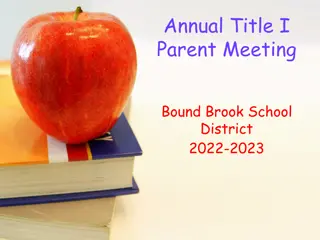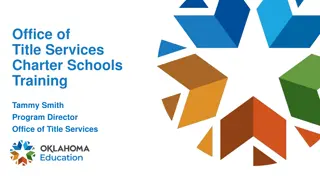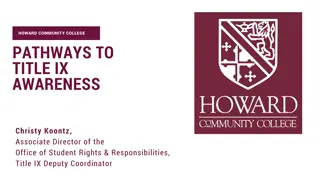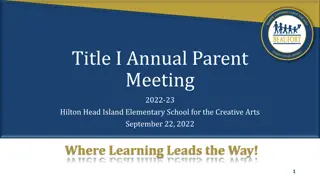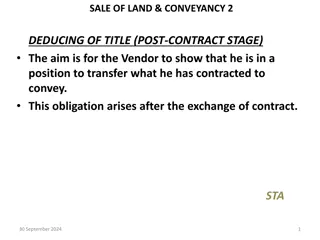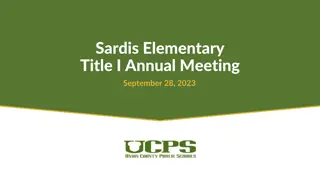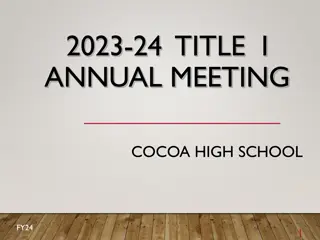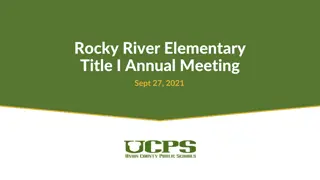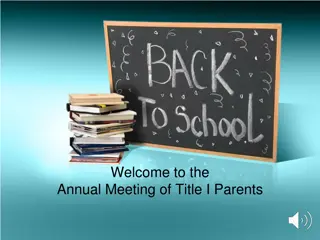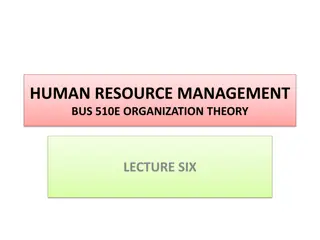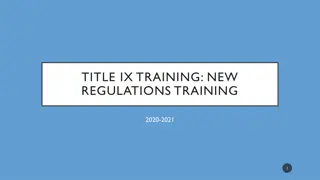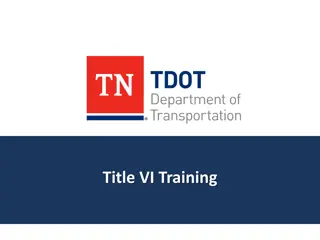Title IX Team Training April 2023
This content provides information related to Title IX team training, basic requirements, supportive measures, common supportive measures, and confidentiality considerations. It covers topics such as discrimination, protective measures, Title IX coordinators, and confidentiality guidelines.
Download Presentation

Please find below an Image/Link to download the presentation.
The content on the website is provided AS IS for your information and personal use only. It may not be sold, licensed, or shared on other websites without obtaining consent from the author.If you encounter any issues during the download, it is possible that the publisher has removed the file from their server.
You are allowed to download the files provided on this website for personal or commercial use, subject to the condition that they are used lawfully. All files are the property of their respective owners.
The content on the website is provided AS IS for your information and personal use only. It may not be sold, licensed, or shared on other websites without obtaining consent from the author.
E N D
Presentation Transcript
Title IX Team Training April 2023 3/15/2025
Jessica Morgan-Tate, J.D. Director of Compliance & Title IX Coordinator Cochise College Sierra Vista Campus, Student Union 1055 Douglas Campus, ADM 105 (by appt) (520) 452-2683 (office) (316) 880-5424 (cell) morgantatej@cochise.edu www.cochise.edu/title-ix/ 3/15/2025
Basic Requirements Prohibits discrimination on basis of sex in education programs Protects students, employees, applicants & all other persons participating in education program or activity Schools must have a Title IX Coordinator Records of investigations, decisions, appeals, informal resolutions and training materials to train Title IX team must be retained for 7 years Title IX Team must be trained on annual basis 3/15/2025
Supportive Measures Offered before or after complaint filed and generally continue through end of process Can be continued even after a finding of responsibility Non-disciplinary, non-punitive services without fee or charge and must be kept confidential to the extent possible Cannot be unduly burdensome on any party Designed to restore education access and/or protect safety or deter sexual harassment Title IX Coordinator responsible for overseeing effective implementation of supportive measures 3/15/2025
Common Supportive Measures Counseling Extension of deadlines or other course-related adjustments Modification of class/work schedules Campus escort services Mutual no contact orders Voluntary leaves of absence 3/15/2025
Confidentiality Considerations Information collected during the Title IX process MUST be maintained in a secure manner BUT Don t overpromise confidentiality due process and other considerations may require disclosure of information obtained through investigation Sharing of information during the Title IX adjudication process is allowed ONLY on a strict need to know basis Notify Complainant of information that will be shared, to whom it will be shared and why 3/15/2025
Application of Title IX Under 34 CFR 106 3/15/2025
Sexual Harassment Defined Under 34 CFR 106 sexual harassment includes: Traditional forms of Sexual Harassment: A school employee conditioning an educational benefit or service upon a person's participation in unwelcome sexual conduct (often called quid pro quo harassment) Unwelcome conduct on the basis of sex that is so severe, pervasive AND objectively offensive that it effectively denies a person equal access to the school's education program or activity (often called hostile work/educational environment harassment) 3/15/2025
Sexual Harassment Defined Under 34 CFR 106 sexual harassment ALSO includes: Dating Violence Violence by a person who is or has been in a social relationship of a romantic or intimate nature with the victim. The existence of such a relationship is determined by: a) The length of the relationship. B) The type of relationship. C) The frequency of interaction between the persons involved in the relationship Domestic Violence Includes felony or misdemeanor crimes of violence committed by a current or former spouse or intimate partner, a parent of a shared child, a former or current co-habitor as a spouse or intimate partner, or someone similarly situated to a spouse under domestic or family violence laws. . . , or by any other person against a victim who is protected under the domestic or family violence laws[.] 3/15/2025
Sexual Harassment Defined Under 34 CFR 106 sexual harassment ALSO includes: Stalking Engaging in a course of conduct directed at a specific person that would cause a reasonable person to a) fear for his or her safety or the safety of others; or b) suffer substantial emotional distress. Sexual Assault Classified as a forcible or nonforcible sex offense by the FBI s uniform crime reporting system; includes: Rape, Fondling, Incest, or Statutory rape 3/15/2025
Education Program or Activity Jurisdiction under 34 CFR 106 requires that prohibited sexual harassment occur within the scope of the institution s program or activities Does not mean geography no on/off-campus bright line rule Includes locations, events, or circumstances over which the College exercises substantial control over both the respondent and the context in which the harassment occurs Conduct must be against a person in the United States Does not apply to study abroad or international education 3/15/2025
Mandatory Dismissal If conduct a) does not meet the definition of sexual harassment under 34 CFR 106, b) does not occur within the scope of education program or activity or c) does not occur in the U.S., the College must dismiss the complaint Can be adjudicated under a separate process (e.g., HR process or student conduct process) 3/15/2025
Permissive Dismissal College MAY dismiss a Title IX Complaint if: Complainant requests dismissal in writing Respondent no longer employed or enrolled at institution Specific circumstances prevent College from gathering sufficient evidence to reach a determination (rare) Discretion of the Title IX Coordinator whether to dismiss for any of the above reasons 3/15/2025
Emergency Removal Student respondent can only be removed from a College program/activity if after an individualized safety and risk assessment, it is determined that there is an immediate physical health or safety risk to any student or individual arising from the allegations which justifies removal of the student respondent Must provide student respondent with notice and opportunity to challenge the removal decision 3/15/2025
Administrative Leave Employee respondents may be put on paid or unpaid administrative leave during a Title IX investigation 3/15/2025
Informal Resolution 3/15/2025
Informal Resolution College CANNOT Use informal resolution in cases involving allegations of employee misconduct involving a student Require parties to participate in informal resolution (process MUST be voluntary) College MUST Have a formal complaint on file prior to initiating an informal resolution process Complete the informal resolution process within reasonably prompt timeframes Allow any party to withdraw from the informal resolution process and proceed under a formal adjudication process at any time Inform the parties about the nature/consequences of any confidentiality provisions within an informal resolution agreement 3/15/2025
Informal Resolution Process Written Notice of Informal Resolution Notice must include allegations, description of the process, including right to withdraw from the informal process, potential consequences of proceeding under the informal process Must obtain written, voluntary consent to an informal resolution agreement Facilitated by Title IX Coordinator or other individual trained in informal resolution and can include conflict resolution strategies such as mediation, arbitration, restorative justice or informal negation Must be impartial and free from conflicts of interest and bias 3/15/2025
Investigations 3/15/2025
Investigator Cannot be the original or an appellate decision-maker Can be internal or external to the institution Must be impartial/unbiased in general and with regards to the specific case If an investigator has an actual or perceived conflict of interest in a particular case, they should be recused from investigating that case 3/15/2025
Prior to Initiating Investigation Filing of Formal Complaint Written Notice of Investigation to the Parties Must include names of all parties, allegations and to extent possible date and location of the conduct alleged, right to advisor and right to review and comment on evidence, must also include statement of respondent s entitlement to a presumption of innocence New allegations discovered in the course of an investigation DO require a new notice of investigation 3/15/2025
Burden of Proof and Gag Orders Burden of proof is on the school, not the parties to the investigation Cochise College uses the preponderance of the evidence standard Cannot prevent parties from discussing allegations or gathering evidence Must protect against retaliation/intimidation or parties and witnesses 3/15/2025
Title IX Investigation Specific steps in a Title IX investigation will change on a case-by-case basis BUT ALL investigations must be adequate, reliable, unbiased, impartial, prompt and provide all parties with equal opportunity to present witnesses and evidence Must provide all parties adequate notice of interview and must include information about the date, time, location, participant and purpose of the interview in advance 3/15/2025
Investigation Process Develop an investigation plan Review available documents, policies, evidence prior to interviewing parties or witnesses Create pre-interview points/questions Determine order of interviews Points to review with interviewees Process, any confidentiality expectations, expectation for honest cooperation, non-retaliation policies (including how to report retaliation) 3/15/2025
Basic Interview Questions & Tips Basic Interview Questions Who committed the alleged acts? Who else was around? What exactly occurred or was said? Include details. When did it occur, and was it a one-time event, repeated event, ongoing? Where did it occur? How did you react? How did it affect you? Are there other individuals who might have relevant information? Did you tell anyone about it? Ask for any available evidence (including social media content). Probe for hidden agendas. Interview tips Consider personality, tone, and psychological dynamics. Focus on facts, avoid spending too much time discussing why? questions. Avoid prejudging evidence. Consider all possibilities. Be an active listener. Take notes or record. Control emotions, be investigative rather than an advocate. 3/15/2025
Written Investigation Report Investigator must ask questions and sort through evidence, both inculpatory and exculpatory, to produce a fair summary of all relevant evidence After conducting all interviews and receiving all evidence, but prior to completion of the investigative report, each party must be provided with copies of any evidence directly related to the allegations in the complaint Each party must have 10 days to submit a written response to the investigator The investigator must consider written responses prior to completing investigative report. Final investigative report must be provided to each party and the party s advisor, if any, at least 10 days prior to the decision- maker making a determination regarding responsibility. Parties must be given an opportunity to review and provide written response to investigative report. 3/15/2025
Decision-Making Process 3/15/2025
Decision Makers CANNOT be the Title IX Coordinator, the investigator assigned to the case or an appellate decision maker CAN be an individual person or a panel of people 3/15/2025
Role of the Decision Maker Neutral party who objectively evaluates all relevant evidence, both inculpatory and exculpatory Inculpatory: evidence tending to incriminate Exculpatory: evidence tending to clear from alleged guilt or fault Oversees the live hearing process and makes determinations of relevancy of advisor questions during that process Reaches a determination of responsibility without deference to the investigation report 3/15/2025
Live Hearing Requirements All parties must have an advisor who may, but does not have to be, an attorney If a party does not have an advisor, the institution must provide one free of charge Cross-Examination Advisors are permitted to ask parties and witnesses relevant questions, including questions that challenge credibility, and to conduct cross-examination Must be live and direct (college cannot require pre- submitted written questions) Decision-maker must decide on the spot whether an advisor s question is relevant prior to its being answered If not relevant, must state it is not relevant, direct the party/witness not to answer and explain why the question is irrelevant 3/15/2025
Live Hearing Procedure and Decorum Parties must be able to see and hear each other in real time (must be a live hearing) The hearing may take place with parties in separate rooms via virtual technology provided by the institution An audio or visual recording or written transcript of the live hearing must be created and be made available to the parties upon request The College may develop rules of decorum to keep the hearing civil and if advisors violate those rules the institution may appoint a new advisor The College does not have subpoena power (i.e., cannot force individuals to participate in the process) 3/15/2025
Determining Responsibility Following live hearing, the decision maker must determine responsibility Did a violation of the policy occur? Must make an independent assessment of the evidence with no deference to the investigation report Credibility Avoid judgments based on protected characteristics or status as complainant, respondent or witness Do not rely on demeanor alone can be inaccurate, especially in traumatic situations Important to take effects of trauma into account Other factors for credibility include consistency; plausibility; and reliability 3/15/2025
Written Decision Letter Decision must be provided to parties simultaneously and is not final until either a written determination is issued following an appeal; or if no appeal is taken, the date the appeal deadline expires Written Decision Letter must include: Identification of Allegations Procedural Steps Findings of Fact Application of Facts to Social Standards Violation Statement of Results and Rationale for Each Allegation Sanctions and Remedies Appeal Procedures 3/15/2025
Decision Maker on Appeal Decision Maker on Appeal CANNOT be Title IX Coordinator, Investigator or Decision Maker and cannot have conflict of interest or bias Can be a single person or a panel 3/15/2025
Appeals Mandatory Appeals College must allow a party to appeal a decision on the basis of: Procedural irregularity that affected the outcome of the matter New evidence not reasonably available at the time of the determination regarding responsibility or dismissal was made IF that evidence could affect outcome; or Title IX Coordinator, Investigator, or Decision Maker had conflict of interest or bias for or against either party that affected the outcome Permissive Appeals College MAY allow appeals on any other basis so long as the opportunity to appeal on those bases are offered equally to all parties Example: proportionality of sanction to offense 3/15/2025
Relevance 3/15/2025
Relevant Evidence Evidence having any tendency to make the existence of any fact of consequence to the determination at issue more or less probable than it would be without the evidence Determining relevance is different that determining how much weight to give the evidence Irrelevant evidence: Excluded Relevant, but not much weight: Included for consideration 3/15/2025
Rape Shield Protections Questions concerning the complainant s sexual predisposition or prior sexual behavior are not relevant unless: Offered to provide someone other than respondent committed the conduct alleged; Incidences concern prior sexual behavior with the respondent and are offered to prove consent 3/15/2025
Privilege Party s medical, psychological, and similar records are not relevant unless voluntarily provided by that party Need written permission by the party to use privileged materials within scope of the investigation Any information protected by a legally recognized privilege (like attorney-client privilege) is deemed not relevant and should not be sought out in investigation 3/15/2025
Impartiality, Conflicts of Interest and Bias in the Adjudication Process 3/15/2025
Impartiality Impartial investigator or decision maker is NOT on anyone s side Goal is to assist in reaching a determination of responsibility based on reliable, relevant evidence NOT to obtain a particular outcome Avoid becoming emotionally invested or engaging in advocacy Endeavor NOT to become overly familiar with any of the parties or to develop a personal relationship with one party over another 3/15/2025
Conflicts of Interest Conflicts of interest occur when someone in the process has a personal or professional interest in the outcome a case that impairs their ability to be fair, impartial and neutral Conflicts of interest should be reported to the Title IX Coordinator immediately 3/15/2025
Bias Bias occurs when an individual has a prejudice in favor of or against one person or group when compared with another Bias is a natural and even normal human characteristic Often bias is unconscious or implicit and it may take conscious effort to confront our own biases Important to recognize, acknowledge and find ways to overcome personal bias within the context of the Title IX adjudication process 3/15/2025
Avoiding Unconscious/Implicit Bias SHRM Resource Guide and Video Recognize, acknowledge and work to divorce yourself from stereotypes or generalizations about groups of people Protected class bias (e.g., race, gender, age, disability, nationality, immigration status, etc.) Campus group bias (e.g., athletes, certain employment positions) Party status (e.g., victim blaming or believe all women mentality) Gather input from diverse sources and viewpoints to the extent possible Avoid focusing on gut reactions and weigh all possible outcomes 3/15/2025
Using Zoom In Live Hearings 3/15/2025
Questions? Jessica Morgan-Tate, J.D. Director of Compliance & Title IX Coordinator Cochise College Sierra Vista Campus, HRB 324 Douglas Campus, ADM 105 (by appt) (520) 452-2683 (office) (316) 880-5424 (cell) morgantatej@cochise.edu www.cochise.edu/title-ix/ 3/15/2025
